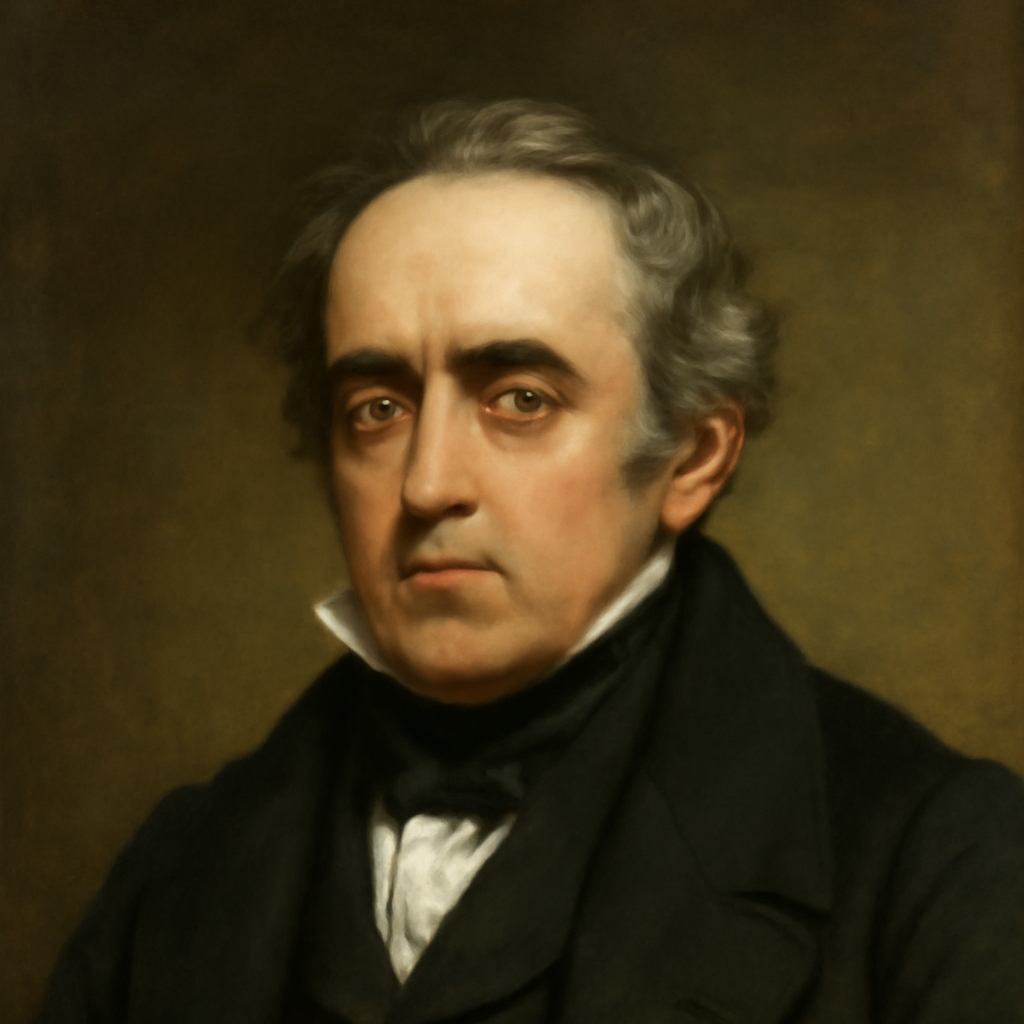A Jacobite's Epitaph
Thomas Babington Macaulay
1800 to 1859

To my true king I offer'd free from stain
Courage and faith; vain faith, and courage vain.
For him I threw lands, honours, wealth, away,
And one dear hope, that was more prized than they.
For him I languish'd in a foreign clime,
Gray-hair'd with sorrow in my manhood's prime;
Heard on Lavernia Scargill's whispering trees,
And pined by Arno for my lovelier Tees;
Beheld each night my home in fever'd sleep,
Each morning started from the dream to weep;
Till God, who saw me tried too sorely, gave
The resting-place I ask'd, an early grave.
O thou, whom chance leads to this nameless stone,
From that proud country which was once mine own,
By those white cliffs I never more must see,
By that dear language which I spake like thee,
Forget all feuds, and shed one English tear
O'er English dust. A broken heart lies here.
Thomas Babington Macaulay's A Jacobite's Epitaph
Introduction
Thomas Babington Macaulay's "A Jacobite's Epitaph" stands as a poignant testament to the enduring power of loyalty and the devastating consequences of political upheaval. This elegiac poem, penned in the 19th century, offers a retrospective glimpse into the tumultuous period of British history known as the Jacobite rising. Through the voice of a fallen Jacobite, Macaulay crafts a narrative that transcends its historical context, touching upon universal themes of devotion, sacrifice, and the inexorable passage of time. This analysis will delve into the intricate layers of meaning woven throughout the poem, examining its formal structure, rhetorical devices, and thematic richness to illuminate the complex interplay between personal conviction and national identity.
Historical Context
To fully appreciate the depth of "A Jacobite's Epitaph," one must first understand the historical backdrop against which it is set. The Jacobite movement, which sought to restore the Stuart dynasty to the British throne, reached its zenith in the 18th century with the failed rebellions of 1715 and 1745. Macaulay, writing nearly a century after these events, chose to give voice to a fictional Jacobite supporter, creating a character whose unwavering loyalty to the Stuart cause led to his ultimate downfall.
The poem's historical setting serves not merely as a backdrop but as an integral element of its thematic exploration. By situating his speaker within this specific context, Macaulay invites readers to contemplate the broader implications of political allegiance and the personal cost of adherence to a lost cause. The Jacobite movement, with its promise of restoring a "true king," becomes a powerful metaphor for the human tendency to cling to ideals, even in the face of insurmountable odds.
Form and Structure
Macaulay's choice of form for "A Jacobite's Epitaph" is both deliberate and effective. The poem consists of nine rhyming couplets, a structure that lends itself well to the concise, declarative nature of an epitaph. This tight formal constraint mirrors the confined space of a tombstone, reinforcing the poem's premise as a final testament carved in stone. The use of iambic pentameter, the traditional meter of English poetry, further anchors the work within a recognizable literary tradition, lending gravitas to the speaker's words.
The rhyme scheme, while consistent throughout, takes on added significance in the final couplet. Here, the rhyme of "tear" with "here" creates a haunting resonance, emphasizing the emotional plea that concludes the poem. This structural choice underscores the universal nature of the speaker's appeal, transcending political divisions to touch upon shared human experiences of loss and empathy.
Voice and Perspective
One of the most striking aspects of "A Jacobite's Epitaph" is Macaulay's masterful use of voice. By adopting the persona of a deceased Jacobite, the poet creates an intimate, first-person narrative that draws readers into the emotional core of the poem. This choice of perspective allows for a nuanced exploration of the speaker's motivations, regrets, and enduring convictions.
The voice we encounter is one of quiet dignity, tinged with melancholy but devoid of bitterness. Despite the speaker's acknowledgment of his "vain faith" and "courage vain," there is no recantation of his beliefs. Instead, we are presented with a figure who, even in death, remains steadfast in his loyalty. This unwavering commitment, juxtaposed against the litany of personal losses enumerated in the poem, serves to heighten the sense of tragic nobility that permeates the work.
Thematic Analysis
At its core, "A Jacobite's Epitaph" is an exploration of the tension between personal loyalty and national identity. The speaker's devotion to his "true king" is set against the backdrop of a changing political landscape, one in which his allegiance has rendered him an exile and, ultimately, a casualty. Macaulay deftly navigates this complex terrain, presenting a nuanced portrait of patriotism that transcends simplistic notions of right and wrong.
The theme of sacrifice permeates the poem, with the speaker recounting the many losses he has endured for his cause. From tangible possessions such as "lands, honours, wealth" to the more abstract "one dear hope," the cumulative weight of these sacrifices builds throughout the poem, culminating in the ultimate loss of life itself. Yet, even in enumerating these losses, there is a sense of pride in the speaker's voice, suggesting that the act of sacrifice itself holds inherent value.
Exile and nostalgia emerge as intertwined themes, with the speaker's longing for his homeland poignantly expressed through specific geographic references. The mention of "Lavernia Scargill's whispering trees" and the "lovelier Tees" serves not only to establish the speaker's English identity but also to evoke a sense of the natural beauty he has been forced to leave behind. This pastoral imagery stands in stark contrast to the "foreign clime" of his exile, heightening the sense of displacement and loss.
The passage of time and its effects on the human spirit is another key theme explored in the poem. The speaker's description of becoming "Gray-hair'd with sorrow in my manhood's prime" encapsulates the premature aging brought about by hardship and longing. This accelerated decline culminates in the speaker's early death, presented as a merciful release granted by a God who "saw me tried too sorely."
Language and Imagery
Macaulay's use of language in "A Jacobite's Epitaph" is both precise and evocative. The poem is rich in sensory imagery, particularly in its depiction of the speaker's nocturnal visions of home. The phrase "Beheld each night my home in fever'd sleep" creates a vivid picture of restless nights filled with longing, while the following line, "Each morning started from the dream to weep," captures the cruel transition from dream to reality.
The poet's diction is carefully chosen to reinforce the poem's themes. Words like "languish'd," "pined," and "sorely" contribute to the overall tone of suffering and endurance. Similarly, the repeated use of the word "dear" — applied to both hope and language — emphasizes the emotional attachments that the speaker has been forced to relinquish.
Conclusion
"A Jacobite's Epitaph" stands as a masterful exploration of the human capacity for loyalty and the profound costs that such devotion can exact. Through its carefully constructed form, nuanced voice, and rich thematic content, the poem invites readers to contemplate the nature of allegiance, the pain of exile, and the universal desire for understanding and empathy.
Macaulay's work transcends its specific historical context to speak to broader human experiences of loss, longing, and the search for meaning in the face of defeat. The poem's final appeal for "one English tear" serves not only as a plea for reconciliation between political factions but as a reminder of our shared humanity in the face of suffering.
In crafting this eloquent epitaph, Macaulay has created a work that continues to resonate with readers long after the political conflicts it references have faded into history. It stands as a testament to the enduring power of poetry to illuminate the complexities of the human heart and the ties that bind us to our beliefs, our homelands, and to each other.
This text was generated by AI and is for reference only. Learn more
Want to join the discussion? Reopen or create a unique username to comment. No personal details required!



Comments
No comments yet. Be the first to comment!